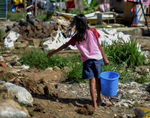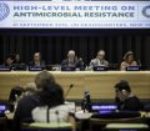Social Watch News
Published on Wed, 2016-10-05 09:41
Three years after the typhoon destroyed more than a million homes and killed 6,000 people, the Philippines has fallen far short on house-building pledge. When Typhoon Haiyan smashed into the city of Tacloban in the central Philippines almost three years ago, Arsenio was one of the lucky ones – he survived by swimming a kilometre to safety. “Every time there is a storm, I get scared, even after three years,” he said. “I don’t want to go through the same thing again.” |
Published on Wed, 2016-10-05 09:37
BankTrack recently published the second edition of its “Banking with Principles?” report, evaluating the progress of global private sector banks towards integrating the UN Guiding Principles on Business and Human Rights into their policies, due diligence processes and reporting. The report is an update to our December 2014 benchmarking exercise, with its scope expanded from 32 banks to 45, and aims to uncover what progress has been made by the banks, 18 months on from the previous report and five years from the establishment of the Guiding Principles. |
Published on Tue, 2016-10-04 00:00
Corporate reporting can provide an essential contribution to monitoring the implementation of the 2030 Agenda for Sustainable Development, according to the UN Conference on Trade and Development (UNCTAD). This conclusion was highlighted in an UNCTAD Secretariat Note titled "Enhancing the role of reporting in attaining the Sustainable Development Goals: Integration of environmental, social and governance information into company reporting" prepared for a meeting of UNCTAD's Intergovernmental Working Group of Experts on International Standards of Accounting and Reporting (ISAR). ISAR, comprising accountancy experts, is holding its thirty-third session from 4-6 October. |
|
Source: . Published on Mon, 2016-10-03 00:00
Three years after the typhoon destroyed more than a million homes and killed 6,000 people, the Philippines has fallen far short on house-building pledge. |
|
Published on Fri, 2016-09-30 22:10
» |
Published on Fri, 2016-09-30 21:52
During the last few years Morocco has adopted some public policies that might help meet the 2030 Agenda objectives, but many challenges have to be confronted in order to ensure to proper and effective progress towards sustainable development. The 2030 Agenda, negotiated by Member States, lays out goals and targets at the global level. Like other countries, Morocco needs to translate these into the national context, with a strategy designed to achieve local priorities. Efforts to achieve the SDGs may be hampered by the government’s persistence in carrying out neoliberal policies (privatization of public services such as education and health for example, austerity and public spending cuts) as part of its commitments to the International Monetary Fund. Similarly, monitoring and evaluating the action plans set out for delivery of the 2030 Agenda is crucial in achieving successes. Unfortunately, this practice is still uncommon in Morocco. |
Published on Tue, 2016-09-27 15:35
It may sound like an issue for health specialists, but at the UN high-level meeting on antimicrobial resistance (AMR) ministers and heads of state from around the world made clear that it is more than that it appears. This is the fourth time that the UN General Assembly has addressed health issues. As the representative of Portugal pointed out, this meeting “is proof of global recognition of this problem and how important an issue it is”. Executive Director of South Centre, Martin Khor said that AMR is “as serious as Climate Change and perhaps more immediate”. |
Published on Mon, 2016-09-26 14:03
It's had a very useful if sometimes controversial past and it will have great relevance for many more years ahead. Three decades ago, the Declaration "broke new ground in the struggle for greater freedom, equality and justice," remarked the UN High Commissioner for Human Rights, Zeid Ra'ad Al Hussein, at a session of the Human Rights Council on 15June, celebrating the 30th anniversary of the Declaration. |
Published on Sun, 2016-09-25 00:00
Several least-developed countries - Benin, Tanzania, and Cambodia among others - voiced their concern at the World Trade Organization on 22 September over the lack of progress in addressing their core issues such as the simplification of preferential rules of origin as promised in the Nairobi ministerial declaration (NMD), several participants told the SUNS. During a meeting of the WTO's Committee on Rules of Origin (CRO), the LDCs reminded the preference- granting developed countries as well as the developing countries declaring themselves in a position to do so to notify the measures they are required to undertake for simplifying the preferential rules of origin under the Nairobi ministerial declaration of December 2015. |
Published on Fri, 2016-09-23 22:33
The adoption of the 2030 Agenda by the UN coincided with a change of government in Argentina, which is reversing the public policies that were put in place to deal with the serious social, economic, institutional and political crisis of 2001 and 2002. In its first months in power, the political coalition Cambiemos (Spanish for Let’s change) shifted away from a development model based on strengthening the domestic market, trade protectionism, expansion of social rights and an active role of the state in income redistribution through the collection of taxes on exports of agricultural products, towards a model favouring free trade, a competitive position in the global market, a lower level of state intervention in the overall economy and a reduction in taxes for the rich. Instead of continuing to expand social protection as required by the SDGs, the current government is aligning public policies with the interests of the sectors with greater political and economic power. The violation of various economic and social rights, which has occurred in a very short time, is creating a gradual and growing rejection within different social sectors. |
SUSCRIBE TO OUR NEWSLETTER











